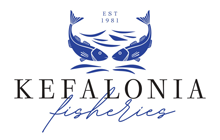Why is Sea Bass and Sea Bream farmed?
Sustainability is the key word when fish farming in involved: Fish farming is by definition an act of sustainable production. When performed responsibly, it lifts pressure off the wild fish stocks, allowing the species to maintain healthy numbers in the wild. Thus, people can still consume high quality marine protein without posing a threat for the wild life-this is especially important when considering the anticipated growth of the human population in the next decades, when food supplies will be challenging. Fish farming additionally helps sustain local communities by creating occupational opportunities in areas away from urban centers. It also allows for higher food security, as fish are raised under controlled conditions, constantly monitored, fed with certified feeds of known content and origin, and packaged and transported under strict hygienic conditions. And lastly it helps seafood wholesalers, retailers and HORECA clients to better manage their businesses, as farming of these species allows for a constant, year round supply of products, not affected by seasonality or shortage in availability.
How many years has Kefalonia Fisheries been producing Sea Bass and Sea Bream?
Kefalonia Fisheries was the first fish farm established in Greece for the production of Sea Bass and Sea Bream, back in 1981. Its history, of 38 years already, has been marked with very important highlights:
-
1981: Kefalonia Fisheries is established in Kefalonia, Greece, for the production of Sea Bass in sea pens
-
1982: The first sea bass juveniles are purchased and imported from Sicily, Italy, and the first production cycle starts in Kefalonia Fisheries
-
Kefalonia Fisheries is the first farm to export Sea Bass and Sea Bream products to Italy and other European countries
-
1985: The structure of the hatchery is completed. The fry production capacity is 1,2 million juveniles. The first batch of Greek fry is produced
-
1990: Kefalonia Fisheries changes status from ΕΠΕ to Societe Anonym. The production size is doubled from 300tons to 600tons
-
1995: Production goes up to 1260tons of commercial size fish and 5 million juveniles
-
1998: Lara Barazi-Geroulanou assumes the position of CEO of the company
-
2001: Implementation of a quality control management system and acquisition of the ISO 9001 certificate
-
2006: Implementation of an Environmental Management system and acquisition of the ISO 14001 certificate
-
2006: Production of certified organic sea bass and sea bream and supply of these innovative products to the European markets
-
2010: Acquisition of the EU Organic Regulation Aquaculture Certification
-
2011: Acquisition of the Friend of the Sea certification of sustainable fish farming
-
2018: Acquisition of the GLOBAL G.A.P. certificate for sustainable production
-
2019: Acquisition of the ASC Sea Bass, Sea Bream & Meagre standard, ASC Chain of Custody
